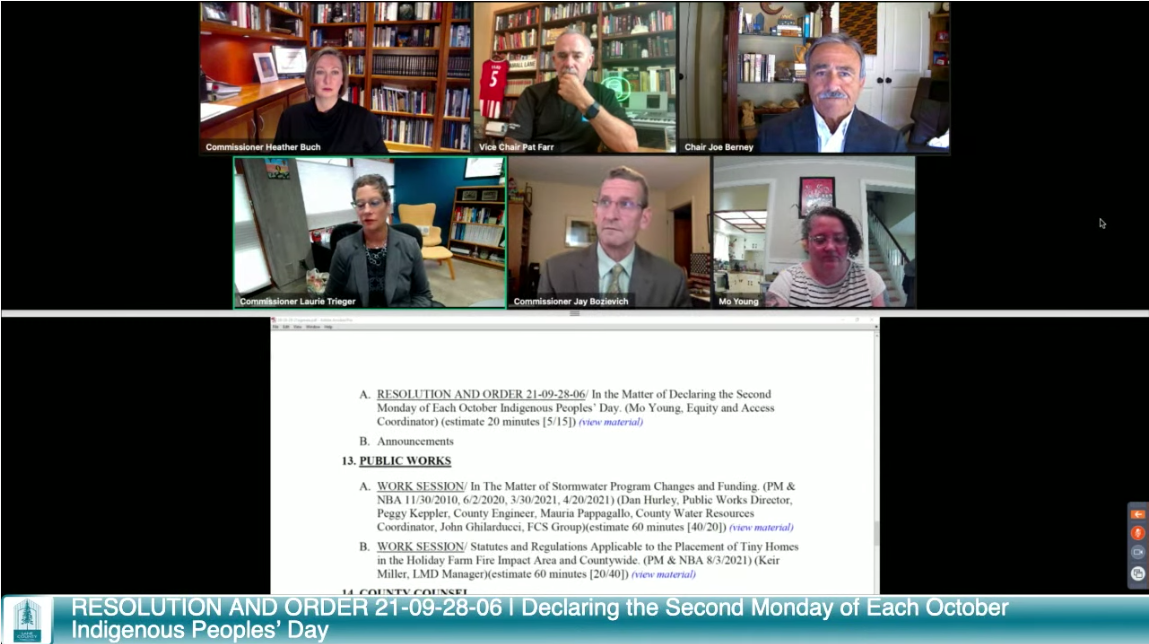On Sept. 28, the Lane County Board of County Commissioners voted 4-1 to establish the second Monday of October as Indigenous Peoples’ Day. The vote follows similar decisions by the cities of Eugene and Springfield to recognize Indigenous Peoples of North America, replacing the recognition of the colonizer Christopher Columbus.
Lane County Commissioner Jay Bozievich voted against making the holiday, saying society unfairly judges Christopher Columbus by today’s morals.
Indigenous Peoples’ Day was first proposed in 1977 by a delegation of Native Nations to the United Nations, according to the board’s Sept. 28 meeting materials. Since then, the state of Oregon and large cities such as Seattle and Portland have declared the second Monday of October to be Indigenous Peoples’ Day, replacing Columbus Day.
Lane County staff worked with local Indigenous leaders who had worked on passing similar resolutions in Eugene and Springfield, who then provided feedback on the resolution draft.
“In spite of what many of us were taught as children, Christopher Columbus did not ‘discover’ the Americas. There were thriving and vibrant Indigenous cultures across this continent long before Europeans arrived,” Board Chair Joe Berney said in a press release that was released shortly after the board’s decision. “This declaration is one step toward recognizing the many contributions Indigenous people have made to our community, particularly the Kalapuya peoples whose traditional homeland is where Lane County now stands.”
Bozievich said at the meeting that he disagreed with replacing Columbus Day with Indigenous Peoples’ Day, saying judging history by today’s standards and moralities isn’t the best thing to do. And, he said, Columbus did things that were amazing for his time, such as navigating the Atlantic Ocean.
Bozievich claimed because Homo sapiens came out of Africa, there are no true Indigenous people. And that the people we think of as Indigenous in North America had displaced people.
“We’re replacing a holiday to try and honor people that were forcibly forced off their land. I don’t think it’s necessary to do that. You could have both and have an honest discussion about the entirety of mankind, how we’ve moved and displaced other people.”
However, Mo Young, Lane County equity and access coordinator, presented the holiday in a different way.
“The intention is that our Indigenous friends and neighbors across the nation have asked us to replace Columbus Day with Indigenous Peoples’ Day, to observe the day that has historically been the day to celebrate what many of us consider to be the genocide and forced removal of the people who lived here when he came,” Young said.
Columbus’ treatment of Indigenous people when he first landed in what is now referred to as the West Indies have been cataloged in his own travel narratives, as well as logs kept by his peers.
In Howard Zinn’s A People’s History of the United States, he writes that on Columbus’ second trip to the Americas, he brought 17 ships and 1,200 men with him with the goal of returning to Spain with slaves and gold. Zinn recounted logs by Bartolomé de Las Casas, a priest who participated in the conquest of Cuba with Columbus and would later become a critic of Spain’s colonialism. Las Casas estimated that 3 million people in Hispaniola had died from war, slavery and the mines.
By 1600, 56 million Indigenous people died from Columbus’ colonizing — which includes deaths caused by disease and violence — according to a 2019 study published in Quaternary Science Review. This resulted in a global temperature decrease, the authors said.
Among other statements, the text of the resolution proclaims that the Board of Commissioners understands that colonization not as a historic event but as a structure based on eliminating Indigenous life and land, “and contends that the celebration of Christopher Columbus and his alleged ‘discovery’ of Indigenous lands celebrates the colonization and dispossession of Indigenous peoples throughout the Americas.”
In addition to making the second Monday of October Indigenous Peoples’ Day, the board encourages other agencies, businesses and organizations to acknowledge the holiday, and the county commits to having meaningful consultation between indigenous peoples to promote the wellbeing and growth of Lane County’s Indigenous community.
Young said that staff will present the board with more information about future action on Oct. 12, which includes making land acknowledgments — recognizing the tribes whose land was stolen — during future public meetings.
